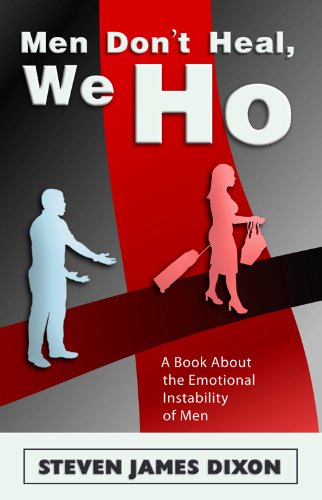"Men Don't Heal, We Ho" - A Book About the Emotional Instability of Men
Steven James Dixon
BOOK REVIEW

In a world where emotional expression is often equated with weakness, Men Don't Heal, We Ho carves out a provocative space for men grappling with their inner turbulence. Steven James Dixon's audacious exploration lays bare the complex web of emotional instability that, too frequently, remains unaddressed among men. This book is not merely a collection of observations; it's a clarion call that challenges the societal norms surrounding masculinity.
With raw candor, Dixon delves into the chaos within the male psyche, inviting you to confront uncomfortable truths. Through a blend of personal anecdotes, psychological insights, and reflective commentary, he forces you to see the often-ignored struggles of men in an emotionally repressive society. The title itself strikes a nerve, implying that while men often navigate life's traumas with stoicism, this façade is merely a mask for deeper wounds that fester in silence. 💔
From the very first page, Dixon's voice resonates with authenticity. He articulates the dissonance between societal expectations and emotional reality, unraveling the notion that vulnerability is inherently feminine. The irony lies in the strength it takes to face those vulnerabilities head-on, a concept that many men have yet to embrace. This book acts as a bridge between the rawness of emotional turmoil and the necessity of healing-a journey that is often viewed as perilous yet ultimately essential.
Critics have noted that Men Don't Heal, We Ho serves as both a mirror and a magnifying glass. Some readers express discomfort with Dixon's unapologetic approach, arguing that it may alienate certain audiences who are not yet ready to confront these conversations. Yet isn't that precisely the point? Pushing the envelope, Dixon's work is meant to stir the pot, igniting dialogue that challenges traditional norms. The title will make you chuckle uncomfortably while simultaneously forcing you to reassess your own emotional literacy.
"You don't just read this book; you experience it." This sentiment echoes through reviews praising Dixon for his fearless exploration of how societal expectations suffocate authentic emotional expression. Critics and readers alike point out that his candid reflections can come off as bracingly honest, serving both as a wake-up call and an invitation to those trapped in the prison of silence. What better way to challenge the status quo than to strip away the masks-layer by layer-until the raw, vulnerable self is laid bare?
The backdrop of the book is equally significant. Released in 2009, Men Don't Heal, We Ho emerges from a cultural moment where the conversation around mental health was just starting to gain traction. In an era marked by heightened discussions on masculinity, Dixon's work is a timely confrontation of the toxic stereotypes that bind men to outdated ideals. The issues he presents are not confined to the pages of this book; they are embedded in the very fabric of our society, influencing everything from personal relationships to workplace dynamics.
Dixon's voice joins the ranks of other groundbreaking authors who have reshaped the narrative surrounding masculinity, inviting us to break free from the chains of silence and shame. Influenced by emotional intelligence advocates and contemporary discussions on mental wellness, his insights urge you to ponder: Why should we allow societal dictate to govern our emotional lives? The implications are profound, leading one to consider the ripple effects on relationships, mental health, and societal well-being as a whole.
This book claws at the heart of a taboo subject, igniting a wildfire of reactions ranging from discomfort to fervent admiration. It's not merely an intellectual exercise; it's an emotional upheaval, a provocation that can shatter preconceptions and help forge a new path toward embracing vulnerability. As you grapple with the content, you may find yourself reflecting on personal experiences, questioning which aspects of your life have been shaped by these cultural narratives.
Ultimately, Men Don't Heal, We Ho serves as a powerful reminder that emotional resilience is not a solitary endeavor. Instead, it is a shared journey that thrives on communal support and understanding. Whether you're a man navigating the throes of emotional chaos or an ally striving to foster empathy, Dixon's fearless narrative offers a guiding light through the tumultuous landscape of emotional instability.
As the final pages turn, a sense of urgency lingers: an imperative for men to engage in healing, to break free from the shackles of stigma, and to reclaim their emotional narratives. It's not just a book you read; it's a call to action, a manifesto for emotional liberation. Embrace the challenge and dive into Dixon's world-your emotional landscape will never be the same. 🌌
📖 "Men Don't Heal, We Ho" - A Book About the Emotional Instability of Men
✍ by Steven James Dixon
🧾 124 pages
2009
#men #dont #heal #book #about #emotional #instability #steven #james #dixon #StevenJamesDixon